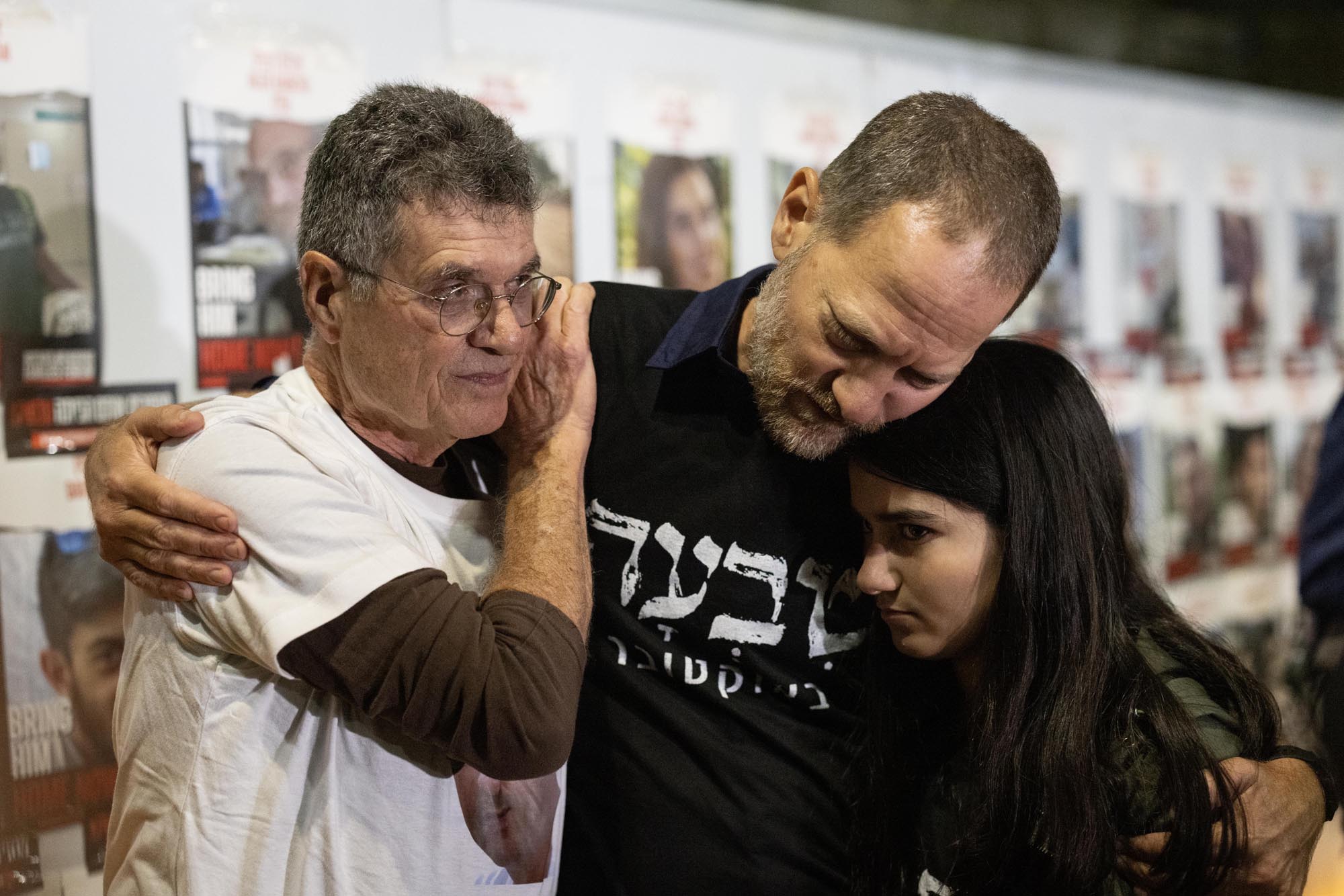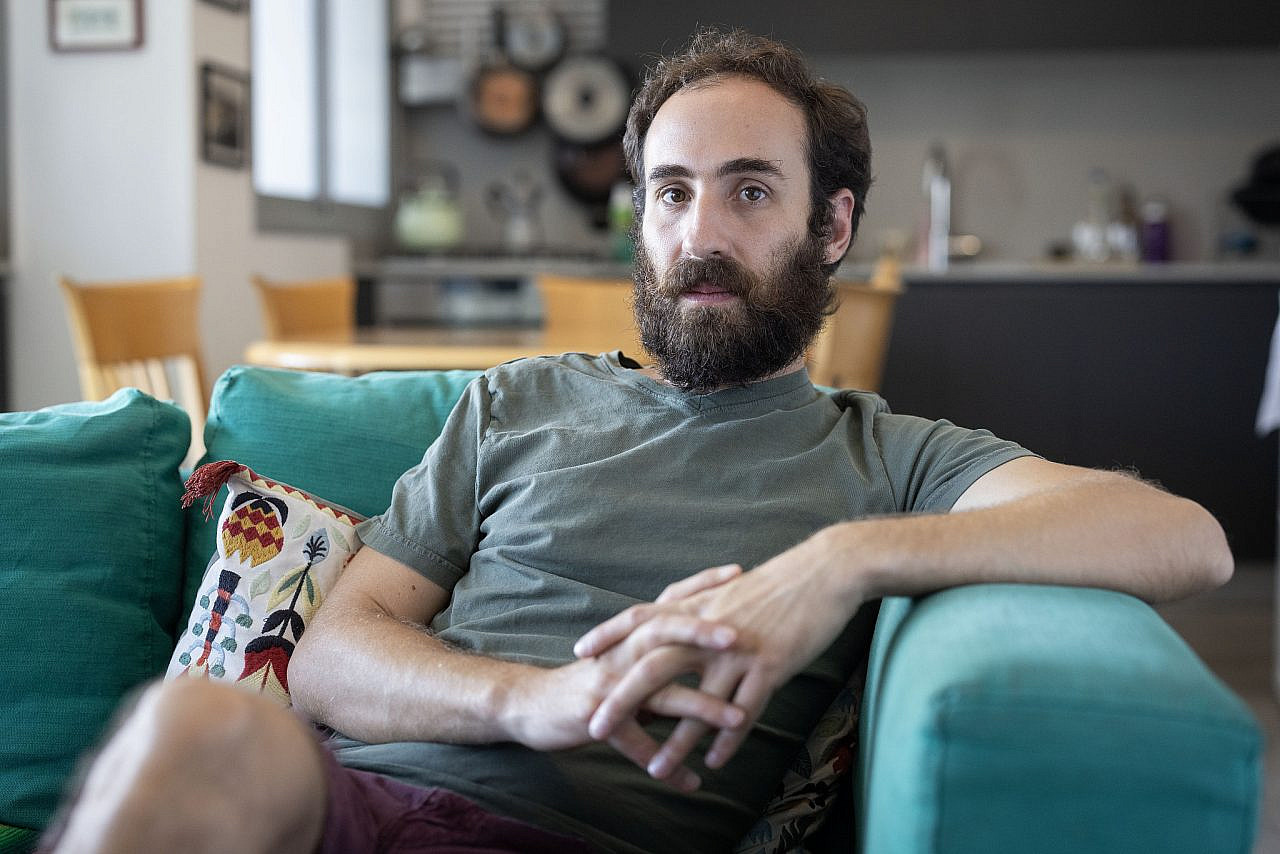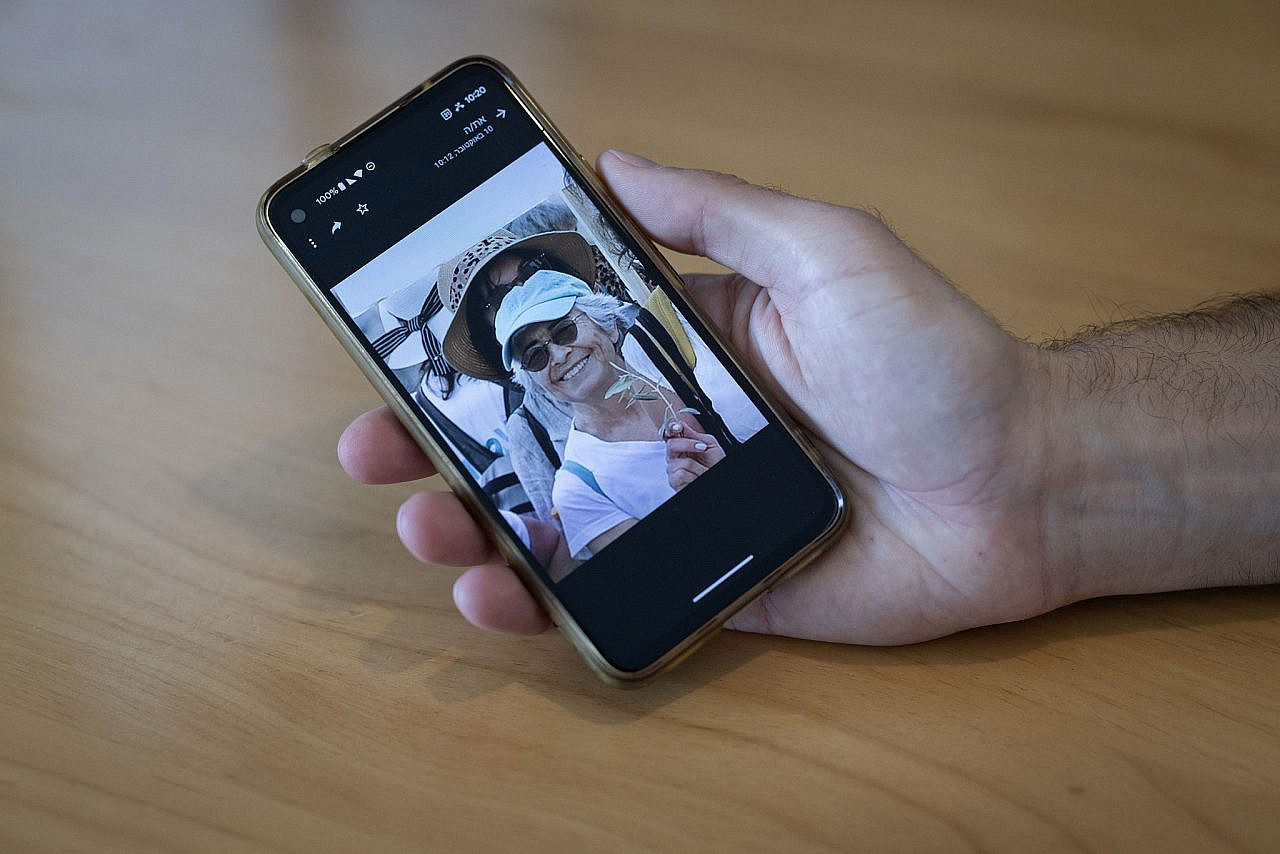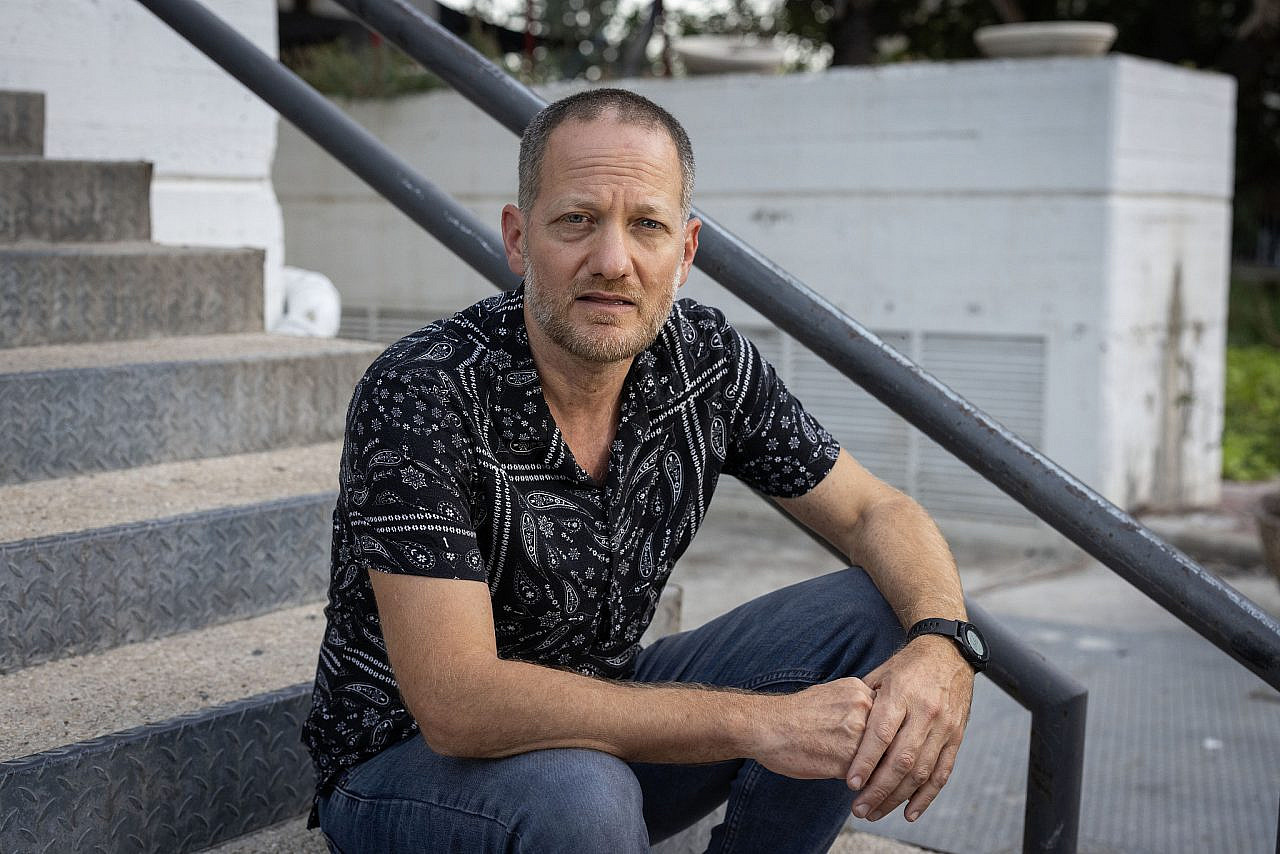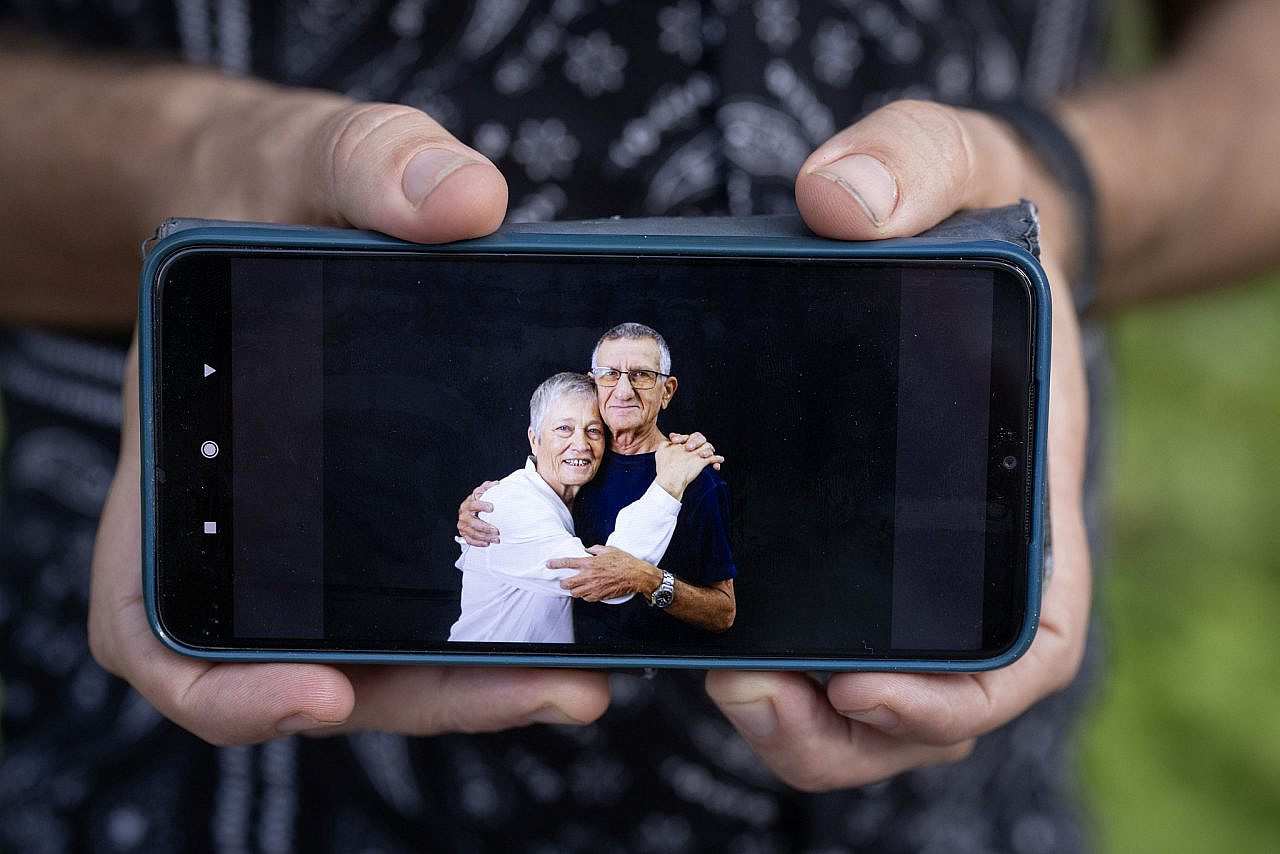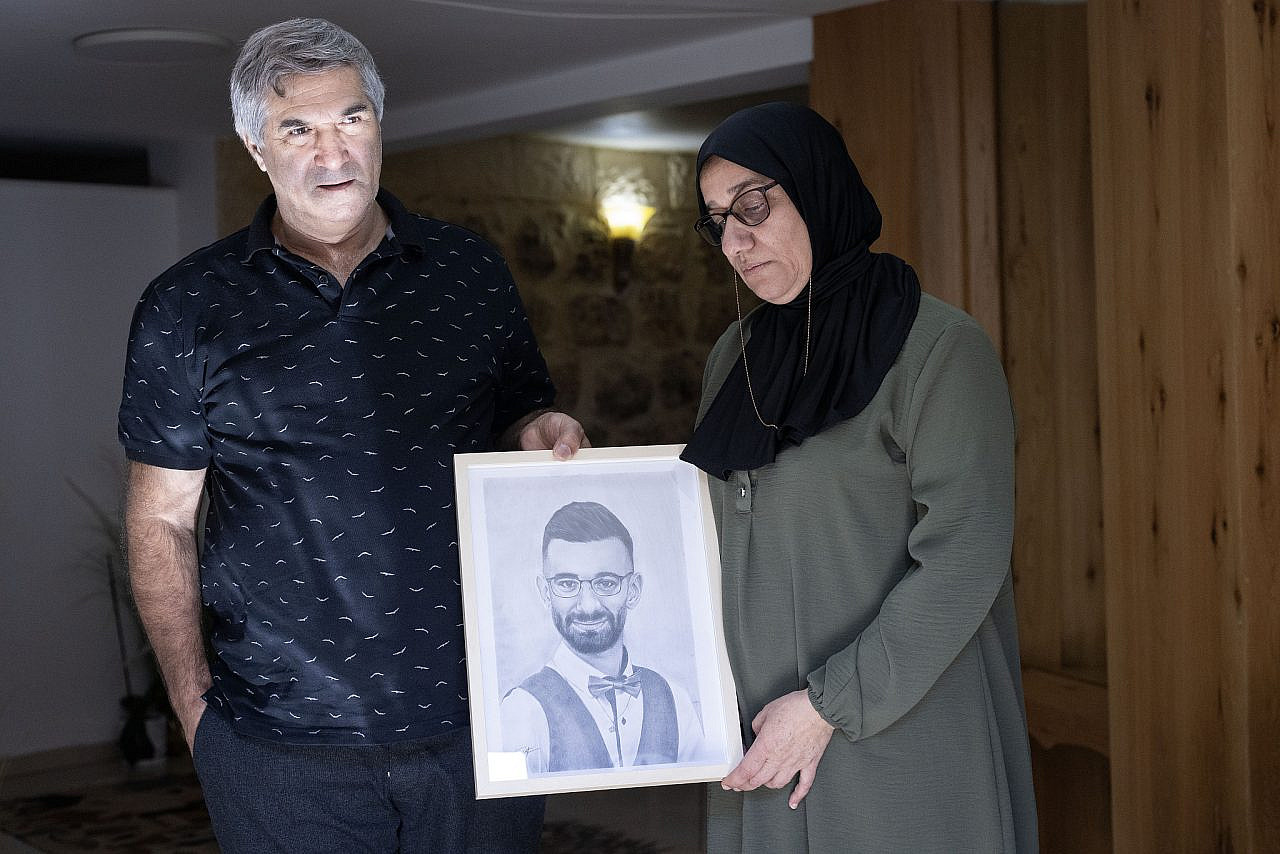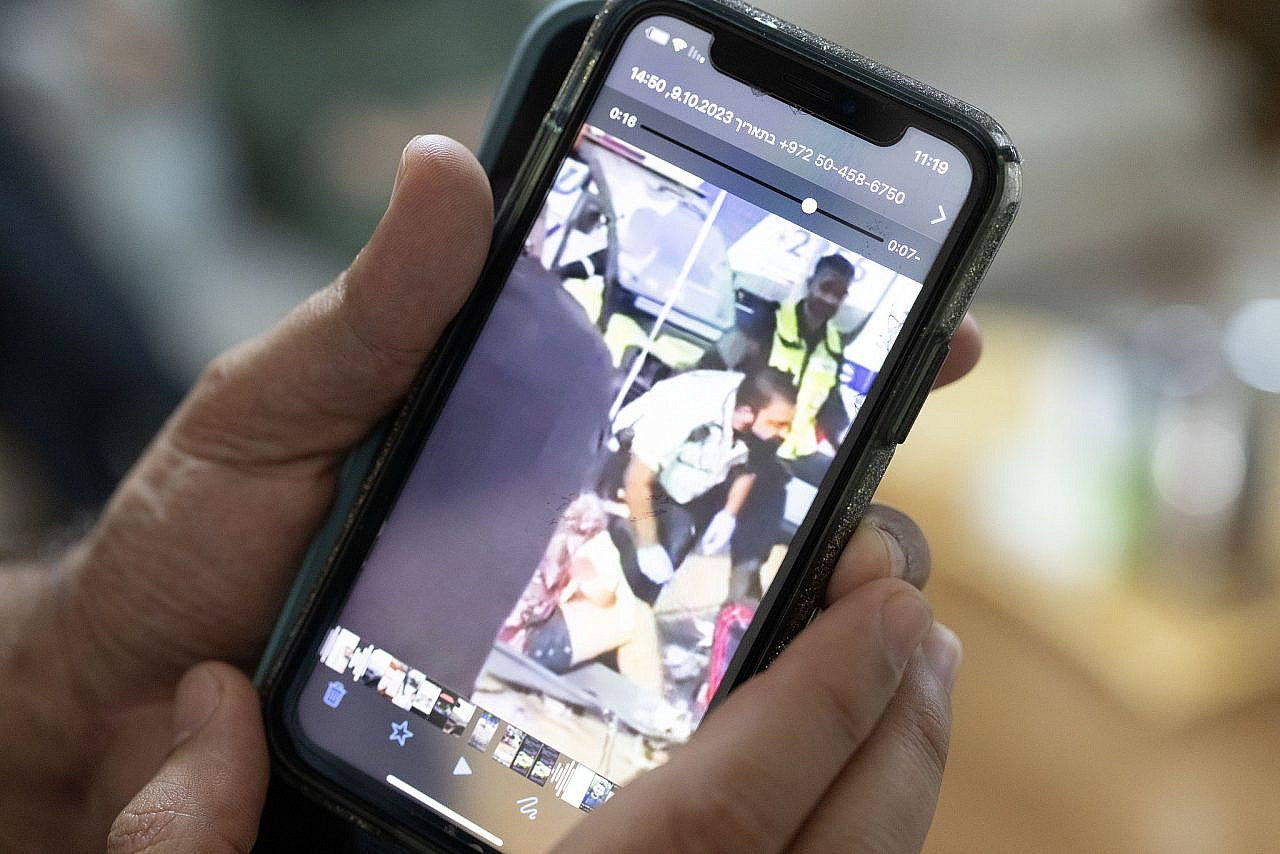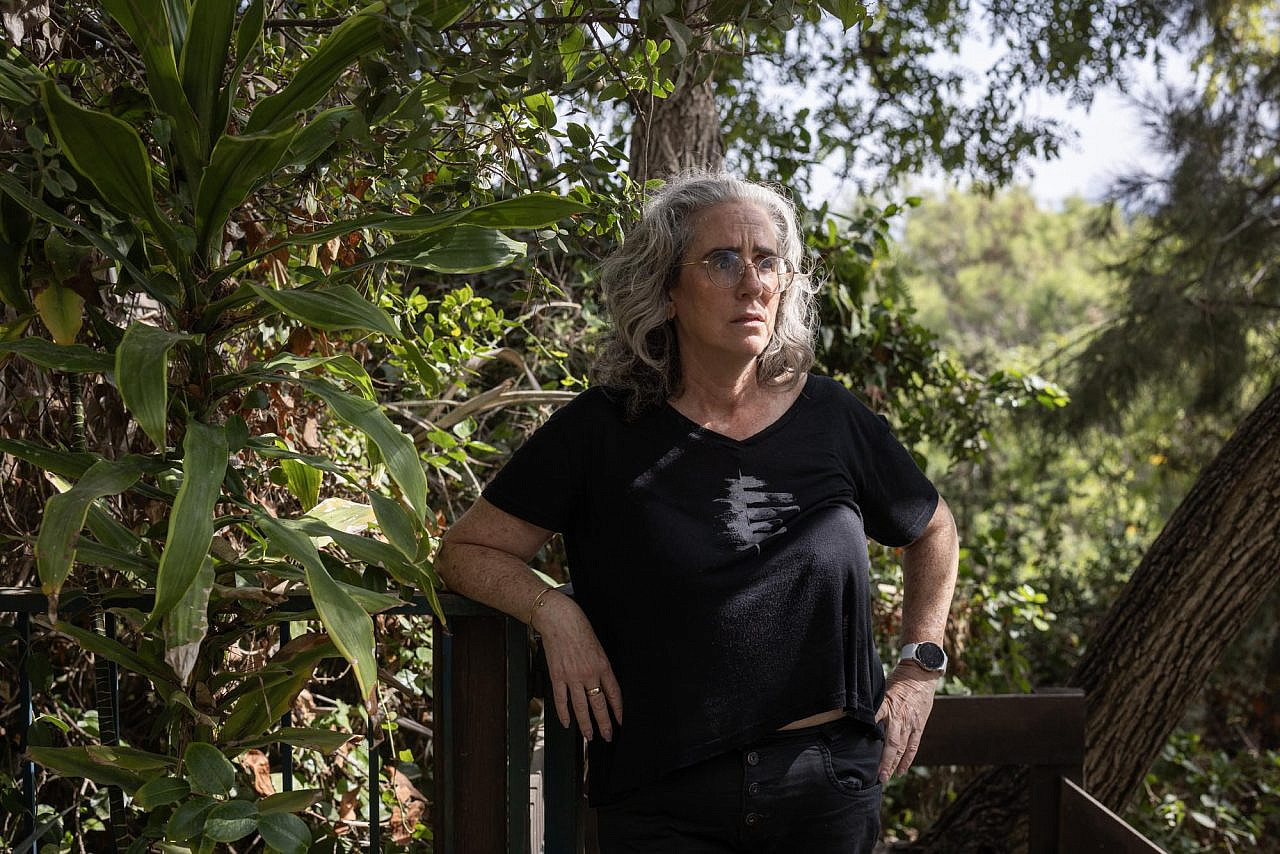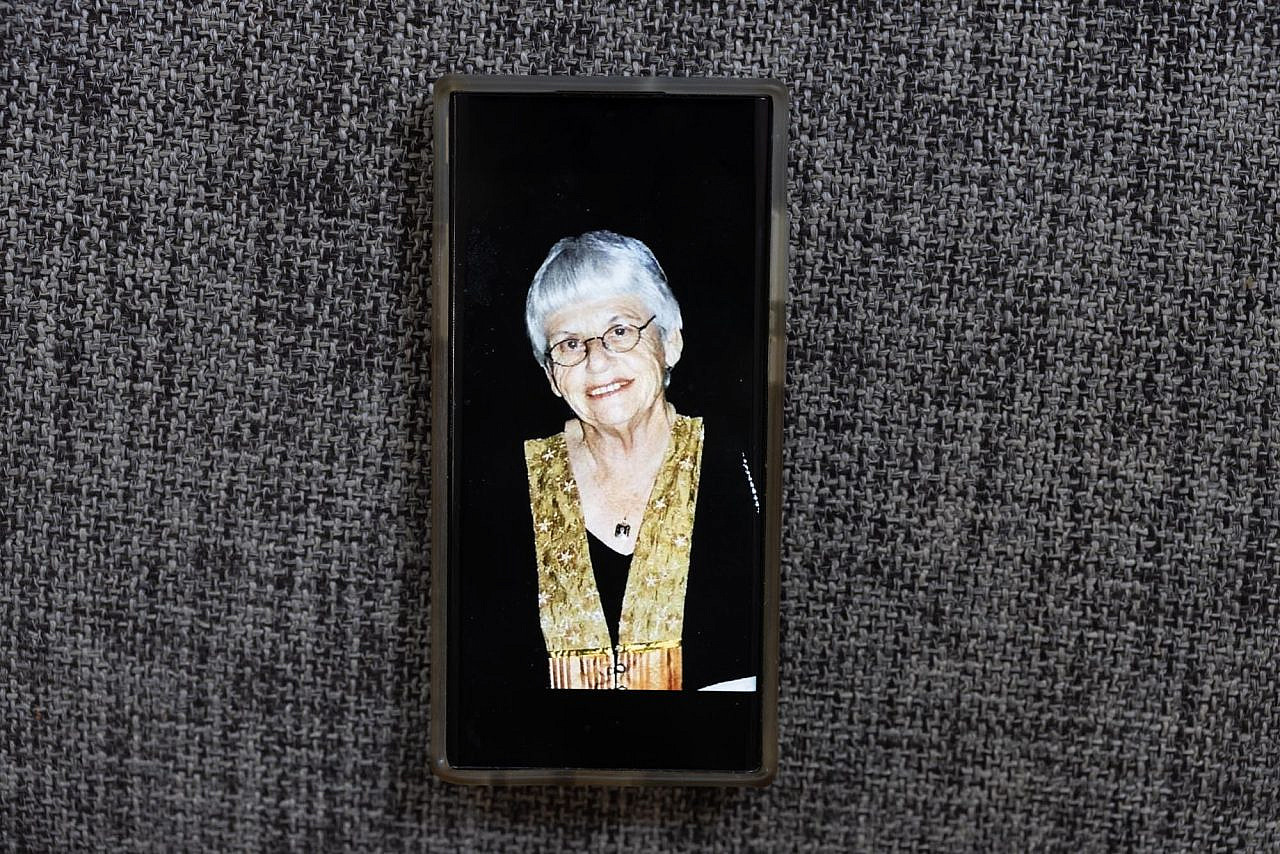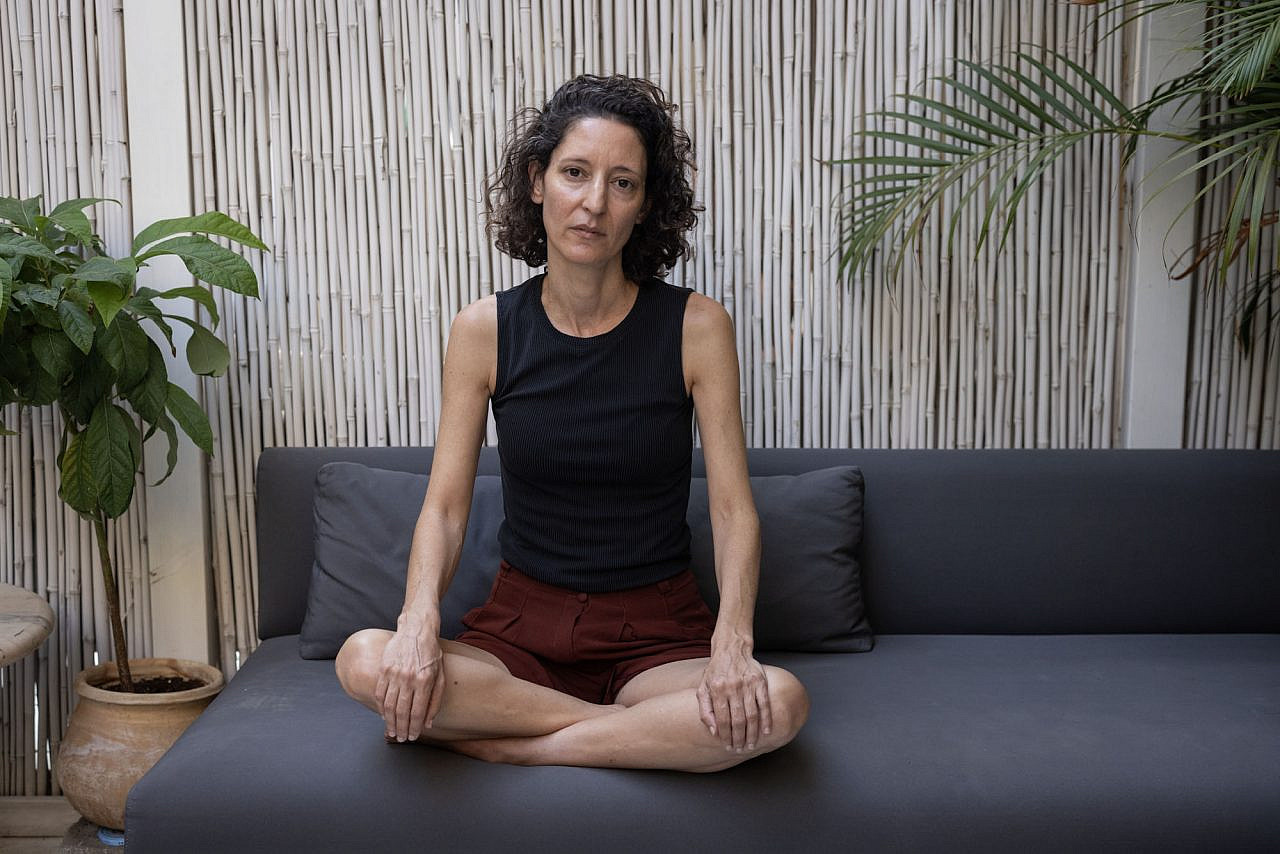Since the atrocities committed by Hamas in southern Israel on October 7, calls for revenge have echoed across the country as the Israeli army continues its bombardment of the besieged Gaza Strip. Talk of “flattening” or “erasing” Gaza is commonplace in the media and on the street. One government minister suggested dropping an atomic bomb on the Strip; others have called for the expulsion of the enclave’s entire population; and just this week, another minister invoked Biblical battles between the Israelites and the Philistines to encourage the military to cut off Palestinian fighters’ foreskins.
Amid this cacophony of retribution, however, many family members of the victims of Hamas’ massacres and of the more than 240 people abducted to Gaza have been offering a different voice. Despite their individual and collective pain, many of them have pleaded with the Israeli government not to seek revenge in their names, and instead called for a cessation of Israel’s assault on Gaza and the prioritization of a deal to release the hostages.
Their efforts bore some fruit, at least momentarily. This morning, it was announced that Israel and Hamas have agreed to a four-day halt in hostilities that will come into effect tomorrow morning, Nov. 23, to allow 50 Israeli hostages to be exchanged for 150 Palestinian prisoners — all of them women and minors. For every 10 additional Israeli hostages released, Israel has said it will extend the truce for another day. Playing down hopes of a longer-term cessation, an IDF spokesperson stressed that this was an “operational pause” rather than a ceasefire, echoing other Israeli officials who indicated that the war is set to continue.
The families’ struggle will go on, too. Even in the most difficult moments of their lives, these relatives insist on reminding their society and their leaders that there are human beings on the other side of the fence. This may seem obvious, but in the political climate in Israel today, it is a message that is difficult for many to accept, and can even lead to arrest or accusations of treason. When this war eventually ends, there is no doubt that these family members will be a significant part of trying to build something new here — a land in which all Israelis and Palestinians can live in peace and equality.
Yonatan Zeigen
Son of Vivan Silver, 74, who was murdered in her home in Kibbutz Be’eri. Zeigen, 35, grew up on Kibbutz Be’eri and now lives in Tel Aviv. (Watch)
“I woke up at 6:30 a.m. in Tel Aviv from rocket sirens and tried to go back to sleep. It didn’t bother me too much. Usually when there are rockets, I don’t worry about my mother: she gets in the safe room [built to withstand rocket blasts] and waits. But very quickly we understood that something extraordinary was happening. There started being reports of pickup trucks in Sderot [an Israeli city close to the Gaza Strip]. Our families sent us photos of the trucks crossing through the fence. We definitely got frightened then.
“I started talking with my mother. You live for so many years with this “conception” that Israel has a powerful army — no matter how much of an anti-militarist you are. We kept saying it would be over any minute. We joked around until there were no jokes left.
“At some point, because of the gunfire outside her window, we decided to stop talking on the phone, and we switched to texting. She wrote they were inside the house, and then: ‘I think they went away.’ I wrote to her: ‘I am with you.’ She said, ‘I feel you,’ and that was it. Her WhatsApp got disconnected at 11:07.
“She [was] a great mother, and an even greater grandmother. All of her adult life she [worked] around issues of gender and distributive justice. As she settled into this country after moving from Canada, she got involved in Israeli-Palestinian relations and dedicated her life to peace and social activism. She co-directed an organization called the Negev Institute for Strategies of Peace and Economic Development. Until the Second Intifada, they worked a lot in Gaza.
“After she went into retirement, she became a leading figure in Women Wage Peace. A few days before [she was killed] there was an international event; they marched in Eshkol and around the Gaza Strip. She always worked, herself or as part of a group, to pressure governments from below to make peace.
“We are in a situation she was trying to prevent. The story is not ‘Look what the leftists have done to us,’ or ‘the Arabs have betrayed us.’ Her way is the right way, as war and violence only bring upon us destruction. During every round of violence, she said publicly that we will never live in security if we continue with the war mentality. Security comes only with peace.”
Yonatan had originally been led to believe that Hamas was holding his mother hostage in Gaza, but, on Nov. 13, she was confirmed to have been killed at Kibbutz Be’eri. At her funeral on Nov. 16, over a thousand family members, friends, and activists came to honor her memory.
“You were a woman of words and big ideas,” Yonatan said during the funeral. “Now, after your death, we will make a bigger effort to bring the tomorrow you always dreamed about.”
Maoz Inon
Son of Bilha and Yakovi Inon, 76 and 78, who lived and died in Moshav Netiv HaAsara, just north of the Gaza Strip. Inon, 48, lives in Binyamina, south of Haifa. (Watch)
“We were born in Kibbutz Nir Am, and raised there until I was 14; then we moved to Moshav Netiv HaAsara, where my parents lived [for the rest of their lives]. Our lives, my life, Israel’s life changed on that Black Saturday, October 7. A terrorist who landed 50 meters from my parents’ house tried and failed to enter the neighbors’ house, [then] saw my parents’ house to the side. He fired a rocket at it — direct hit — and that was it.
“On [that] morning, still in bed, I checked my WhatsApp messages. I saw that dad had written in the family group that there were rocket sirens, and they were in the safe room. I did not get too upset yet, because strange as it is, this is normal.
“I went down to make coffee, and meanwhile I saw there were incursions in communities adjacent to the fence. At 7:40, I called, and [dad] said they were in the safe room and there was gunfire around. I went to the Eye of Palestine Instagram [page] and saw what was going on from the other side. Toyotas [belonging to Hamas] in the middle of Sderot. I said, ‘Wait a minute, I had better call dad again.’ That was at 7:45, but there was no answer anymore.
“We were in touch with the neighbors. We gathered with all my siblings and all my parents’ grandchildren at my sister’s house. At 5 p.m. the moshav’s head of security told us the house had been burned to the ground, and there were two corpses inside.
“We decided we would start sitting shiva [a seven-day Jewish mourning ritual] the next day. Many friends of mom and dad came, including other survivors and members of grieving families. The shiva was devastating, our own personal catastrophe, together with the catastrophe of our communities.
“I cried for my parents and all the friends and families, but also for all those who will still die in the war. I cry for the soldiers who will die in a [ground] invasion, I cry for the Palestinians. I cry for the lost time.
“They were in their prime. Dad was doing Pilates, walking five to 10 kilometers a day, working full time. Mom would swim every morning, paint for hours, teach, and protest [against the government] once a week. [They were] a loving grandma and grandpa to their 11 grandchildren, and [parents to their] five children.
“My first message is to stop the war: an immediate ceasefire. If this does not happen, the catastrophe will be many times greater.
“My second message is to return the hostages immediately to their families. The government that abandoned them, that did not come to rescue them from the safe rooms for 30 hours, that paid no attention to all the warnings, needs to bring them home. No matter how many prisoners we release, no matter if they have blood on their hands, we have to bring everyone home.
“My third message is that we have to get Netanyahu out of the prime minister’s office. If he does not resign, we have to end his rule, otherwise our physical existence here is in grave danger.
“The fourth message, which is hardest, is to keep spreading hope. Hope that things here can be better, hope that Israelis and Palestinians can live together, under values of peace, equality, and partnership. We have to believe in this, know that it is possible, and work to achieve it. How we do it, I do not know, but I know it is possible.
“Vengeful feelings are human. Who am I to say there is no real motive for this feeling. But it is not for nothing that it is said and written: ‘May God avenge their blood.’ Vengeance is only in the hands of heaven. Anyone calling for vengeance is a false messiah, a false prophet, and a false leader.
“Our tears will wash the blood from the earth, and then we will see the solution: forgiveness and believing in a better future.”
Musa and Huda Darawshe
Parents of Awad Darawshe, 23, an ambulance driver who was working at the music festival in Re’im, and stayed to treat injuries under fire until he was murdered by Hamas militants. The Darawashes, 62 and 59, live in Iksal, south of Nazareth.
Musa: “[Awad] was the youngest boy in the family. He always wanted to help people, always thought about others, smiled a lot, and was always looking to the future. I do not think he ever quarreled with anyone in the village. Everyone who knew him cried [when they heard the news].
“He studied medicine in Georgia, then during the Corona crisis he did not want to continue studying via Zoom. He came back, trained to be a medic, and got an ambulance driver’s license.”
Huda: “He worked as a medic at the party, and was responsible for an ambulance and an all-terrain vehicle. On Thursday [Oct. 5], he said he left the office, on Friday his sisters spoke with him, and on Saturday we did not hear from him.
“Everyone ran away at first [when the shooting began]. When it went quiet, they told him to come back, and he came back to help. Again they said run away, and apparently he did not manage to run, he hid beneath the stage. We read his messages with his boss during the shooting. He wrote: ‘Where is the army, we are going to die. Come save us, I am dead.’ They shot him beneath the stage.”
Musa: “They started spraying bullets there, it did not matter who or what. And I lost my son. Enough! Let him be the last one. Until when does one kill another? I turn to all those responsible in this state, in Gaza, and everywhere: enough of this. Let us make peace. We will live together, sit together. We are cousins, as the President [Isaac Herzog] told me when he spoke to me. So let us live together, in peace and quiet, what is all of this headache for?
“How much longer will I live? From now it is all black. These are black years, you cannot imagine. For me there is no life anymore. Life is over for me.”
Huda: “We pray to God that there will be peace for all people. That he will take mercy on all people. We are all mothers, we all have families.”
Neta Heiman Mina
Daughter of Ditza Heiman, 84, from Nir Oz, who is held captive in Gaza. Heiman Mina, 50, lives in Haifa. (Watch)
“I was born and raised in the Kibbutz Nir Oz, before the time of the Qassam rockets, back when we still used to go to Gaza for shopping. On October 7, my mother was at home in the kibbutz. We talked with her Saturday morning. We asked her if she was in the safe room and whether it was locked. You cannot lock safe rooms. I do not think she knew that, and I certainly did not.
“Around 10 a.m. we lost contact with her. We were climbing up the walls. We did not know what was going on. We started activating the WhatsApp group for our high school cohort. We noticed that some of the people were communicating, and some were not.
“At 4 p.m. Hamas answered her phone. After that a neighbor told us he had heard her yell for help. He went out with a pistol, tried to help, saw he had no chance, they fired a burst of bullets at him, and he went back into his safe room.
“After the kibbutz was retaken [by Israeli forces], they conducted a search and said her house was empty. [We had] mixed feelings of terrible worry [because my mother is] an old woman who needs her medicines, and terrible anger at the government which allowed [this to happen] and at the army which was not there.
“A few days later my nephew found a Hamas video showing her being taken and getting in a car. A few hours later the army came and told us she was believed to be a hostage. We asked, ‘How do you know?’ and they said, ‘From the video.’ Since then, there has been no information.
“First of all, do not ‘erase Gaza’ when my mother is there. There are 240 hostages there, 79 of them from my kibbutz alone. If you bomb Gaza, you bomb them.
“Second of all, we always hear after every round [of fighting] that ‘Hamas has been dealt a severe blow.’ And then eventually comes the next round, and it is worse. The conflict only escalates, the situation does not improve. Maybe there is a short period of quiet, but the quiet is not real.
“I believe the solution can only ever be diplomatic, it cannot be military. There is no chance we can destroy [Hamas]. The more damage we cause there, the more anger we produce, we raise another angry generation, and this anger is ultimately directed toward us.
“We have to finish this story, bring back [the hostages], and end the war. Not send our children [the soldiers] in there now. When I just start to think about a land invasion, I think about all my son’s friends and all of my friends’ children. They are the ones who will be killed there. Does this help us? I do not believe it does.”
Yaacov Godo
Father of Tom Godo, 52, who was killed in Kibbutz Kissufim. Godo, 74, lives in Kibbutz Na’an, southeast of Tel Aviv, and is an activist with the left-wing group Looking the Occupation in the Eye, whose T-shirt he wore to his son’s funeral. (Watch)
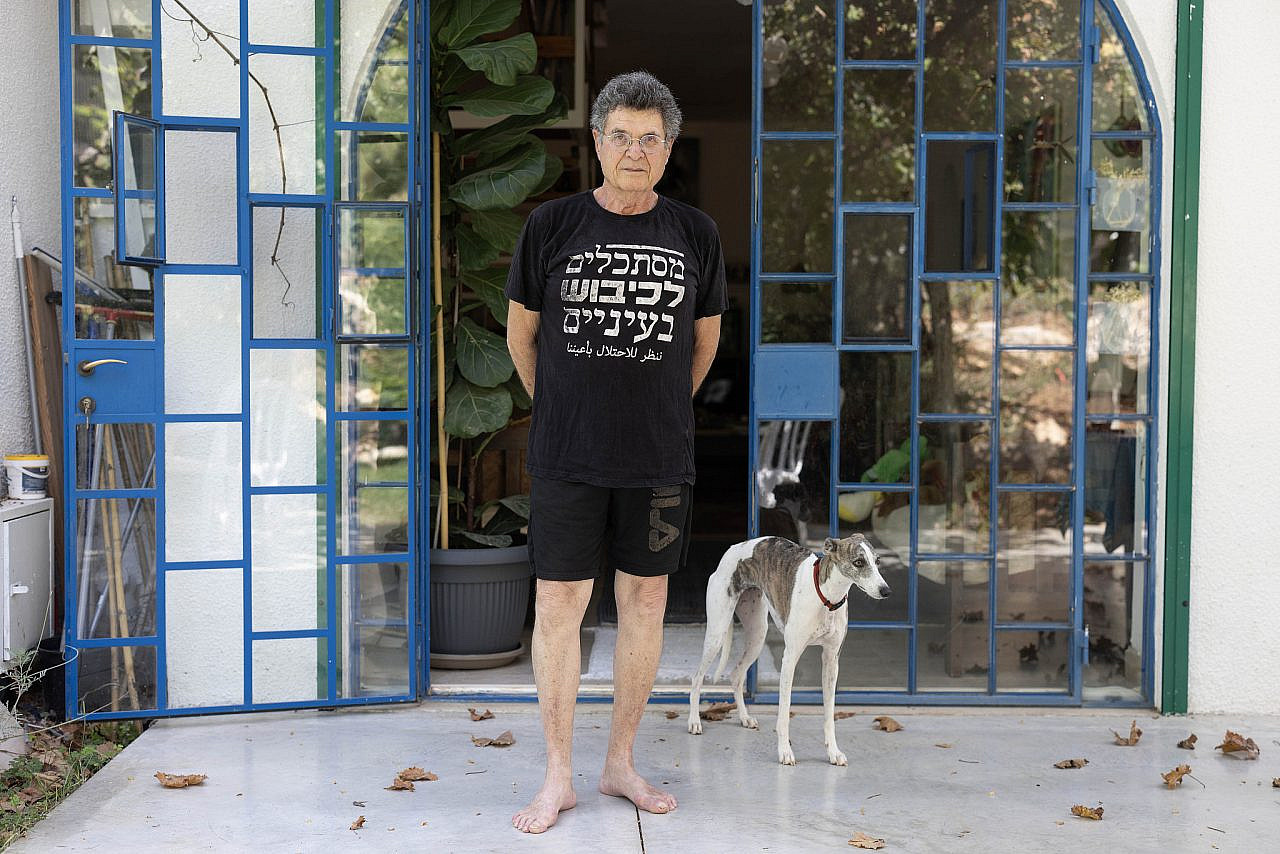
“Tom was killed at Kissufim on Sunday morning, Oct. 8, after he and his family had been barricaded in a safe room for 25 hours. Hamas forces attacked the house and fired on the safe room window. Tom kept them from coming in by holding the safe room door handle, and was shot with at least two armor-piercing rounds and killed on the spot. Limor, his wife, opened the safe room window, threw the girls out, jumped out, and they were saved.
“I am still processing the grief and every day that passes is harder and harder. I maintain that we must not move towards vengeance. Vengeance is weakness. I just do not believe in it.
“We have to replace the whole conflict management approach. [Hitting] Hamas will not solve any problem. [We must] stop pulverizing Gaza. I have taken children from Gaza in my car, cancer patients, to the hospital and back, and some of them are probably no longer alive, whether from the bombings or because they stopped receiving treatment. There is no sense in tormenting a civilian population this way after it has lived through Hamas rule for years.
“For two and a half years now, I have been going down to the Jordan Valley at least once a week, accompanying Palestinian shepherds who are harassed by the residents of illegal settlement outposts with backup from the army. Two days after [October 7], there was an attempt, mostly successful, to ethnically cleanse a number of shepherd communities in the Jordan Valley and the central mountain ridge east of Ramallah. Almost all of those communities have fled.
“I wrote a social media post which got a crazy amount of support: I plan to go to Jerusalem and stand in front of the entry gate to the Knesset with a sign saying, ‘My son was killed near Gaza, his blood is on the heads and hands of this evil government. We will neither forget nor forgive.’ Hundreds if not thousands of people identified with this message and said they will come with me. We mean for hundreds of thousands to come, sit around the Knesset, even if they experience violence at the hands of police and of Netanyahu supporters. [I hope] this thing will do something, and the government will resign.
“The [anti-government] protests cannot continue playing the same role they did in the past 10 months. Big parts of the protest movement have to go into politics, into the Knesset, with a very clear agenda of human rights, of ending the occupation.”
Ziv Stahl
Sister in-law of Mira Stahl, who was killed on October 7 in Kibbutz Kfar Aza. Stahl, 46, is the executive director of Yesh Din, which documents human rights violations in the occupied West Bank. She was at her family’s home in Kfar Aza when Hamas militants raided, and she hid in her sister’s safe room for about 14 hours until she and her family were rescued. (Watch)
“I came to visit my family in Kfar Aza on Friday [Oct. 6]. I was staying with my sister. On Saturday, we woke up at around 6:30 am to the sound of very loud explosions and sirens. We ran to the safe room. After a while there was a brief respite, and we left the safe room to use the bathroom. Soon there were sirens again, and we returned to the safe room. My sister’s husband saw groups of Hamas fighters in the kibbutz — that’s when we understood that something serious was happening.
“Throughout the entire ordeal we stayed in touch with our family members who were also on the kibbutz. My sister-in-law hadn’t answered her phone since the morning. We were really worried about her, but we thought that maybe she had entered the safe room without her phone, or that she had gone to help someone. She is usually part of the team that helps out during emergencies. We thought maybe she had gone to someone else’s house. But as time went on, we realized that she had probably been murdered. We got confirmation two days later, when her neighbors were rescued and told us they’d seen her.
“I don’t have a desire for revenge that I need to get over. There are human beings living on both sides. At the end of the day, the large majority just want to live well. I don’t believe in centering everyone’s humanity just because it’s moral: it is simply pragmatic. We’ve been living for years with continuous rounds of fighting and escalation. It’s a cycle that repeats itself. Until we find another way of thinking, this cycle will only get worse.
“We built a wall, and then there were tunnels. We blocked the tunnels, and then there were incendiary balloons. The human mind is creative. We can invest our creativity into building checkpoints and weapons and ways to win the war, or we can take that creativity and invest it in finding another solution, one with more brains and less muscle, to end this so that everyone can live a better life.
“That’s how I grew up. I’ve dedicated years of my life to this. I have strong faith in humanity. There’s a tendency to look at people like me as naive, but I think it’s pragmatic. We cannot fight forever. History teaches us that eventually wars end, even if it takes a hundred years.
“It’s hard for me when people speak in others’ names, especially the right wing. Each one of the families has a different opinion, and each one of us has the right to express their opinion. Opinions like mine have been delegitimized and even hidden in parts of the media, in favor of endless talk of ‘erasing Gaza.’ There’s no need to act out of revenge, to flatten Gaza, to shoot indiscriminately, and to hurt even more innocent people on either side.
“There’s no simple solution, obviously not now. But I have no doubt that even if Hamas is knocked down, something else will take its place. At the end the solution will have to be a long-term political one.”
This article was published in collaboration with Local Call and The Nation.

